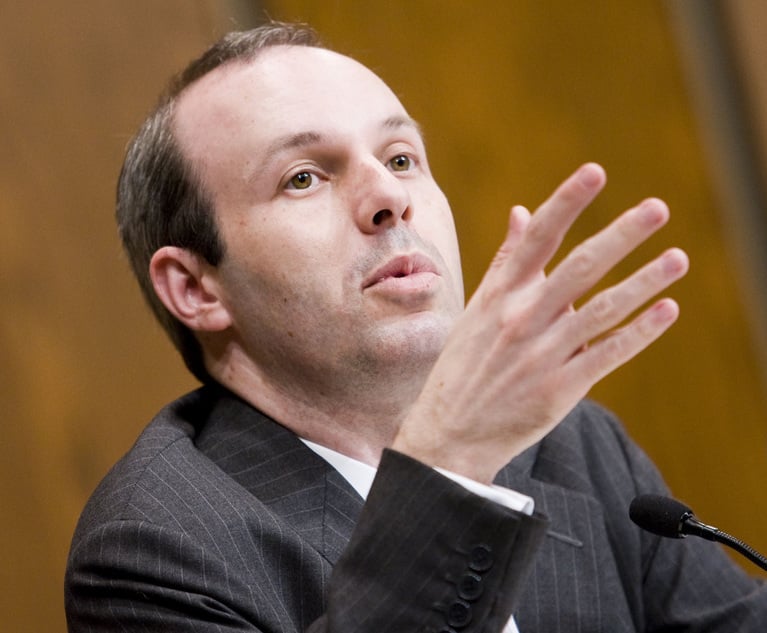'One-Sided' Rulings in Supreme Court's Hot-Button Cases Will Threaten Its Legitimacy, Advocates Warn
"Not since Bush v. Gore has the public perception of the court's legitimacy seemed so seriously threatened," said Irv Gornstein, executive director of the Supreme Court Institute at Georgetown University Law Center.
September 21, 2021 at 03:08 PM
6 minute read
 The U.S. Supreme Court building is seen in Washington, D.C., on September 23, 2020. Photo: Diego M. Radzinschi/ALM
The U.S. Supreme Court building is seen in Washington, D.C., on September 23, 2020. Photo: Diego M. Radzinschi/ALM
Land mines for the legitimacy of the U.S. Supreme Court exist in a new term likely to be overtaken by challenges from Mississippi and Texas to the justices' abortion rights precedents, according to some veteran high court advocates.
"Not since Bush v. Gore has the public perception of the court's legitimacy seemed so seriously threatened," Irv Gornstein, executive director of the Supreme Court Institute at Georgetown University Law Center, said Tuesday while noting that four justices—John Roberts Jr., Stephen Breyer, Clarence Thomas and Amy Coney Barrett—have felt compelled recently to defend the court as a nonpartisan institution.
"I think we may have come to a turning point," Gornstein added. If within the span of two to three terms, there are "sweeping, one-sided" decisions in cases such as voting, abortion, guns, religion and affirmative action, he said, "The perception of the court may be permanently altered. If the justices think a few unanimous decisions and votes against type will counter that impression, I think they may be deluding themselves."
Gornstein was one of four former assistants to the U.S. solicitor general and one former acting U.S. solicitor general who examined the key cases in a preview of the upcoming term that begins Oct. 4. In addition to Gornstein, the panel included Sullivan & Cromwell partner Jeffrey Wall, Mayer Brown partner Nicole Saharsky, Latham & Watkins partner Roman Martinez, and former Jenner & Block partner Paul Smith of Georgetown University Law Center.
And although they all agreed there are potential threats to the court's legitimacy in the term's cases involving abortion, gun rights, religion and perhaps affirmative action, they disagreed on whether those threats will materialize in "sweeping, one-sided decisions."
"I do think there's a sustained campaign to delegitimize the court, which has gotten some traction on the left," said Martinez, noting recent polls showing the decline in the court's favorability rating. "Frankly the court, to its credit, is defending itself. Justice Breyer's new book is pretty courageous in defending the court and taking the longer term view."
Martinez acknowledged there is "some danger" for the court, but he added, "I hope the court's response is: 'I don't think judges should be listening to the public and tailoring their rulings accordingly.' But there are people out there who think they should."
Smith, however, pushed back, saying a series of events show there is "not just a manufactured" campaign. "The court is going to be way to the right on a number of issues and we got there through the handling of the [Merrick] Garland and Barrett situations. A lot of people are very upset with how we got here. I don't think that will go away."
During the confirmation hearings for Brett Kavanaugh and Barrett, predictions were made about how they would vote on issues, such as the Affordable Care Act, recalled, Martinez. "If you look at the track record of the court over the past few years, none of those things came to pass."
But one area where the court's conservative majority has not held back, Smith countered, was in any case involving elections. "They always end up favoring their political side: campaign finance, partisan gerrymandering, voting rights. This is the area where people think politics come into play."
Where all of them did agree was on the role that abortion may play in the new term and a decision's effect on the public's perception of the court. The justices are set to hear arguments in Mississippi's 15-week abortion ban Dec. 1. That case also asks the justices to overturn their 1973 landmark ruling in Roe v. Wade and their 1992 decision reaffirming Roe in Planned Parenthood v. Casey.
"If the court is prepared to overrule Roe, what it does on guns and affirmative action is not going to be strong wind in the sails," Wall, acting U.S. solicitor general in the Trump administration, said. "If they strike down affirmative action and somewhat expand the Second Amendment, it won't create some kind of groundswell with the public unless accompanied by some watershed ruling on abortion."
And a related major question, Saharsky said, is whether the Texas abortion case will overtake the Mississippi abortion case. The court on Sept. 1 in a 5-4 vote allowed Texas' six-week abortion ban to take effect after rejecting a stay request from an abortion clinic. Chief Justice Roberts was the only conservative to dissent, along with the court's three justices on the left.
"I can imagine the public pressure will continue to grow," she said. "Right now there's almost no ability to get an abortion in Texas. But how does the court grant relief given the posture of the case?" The Texas law cedes enforcement only to private citizens who can be awarded $10,000 if they prove the law has been violated by an abortion provider or anyone who aids and abets an abortion.
Smith suggested "the cleanest way" for a challenge to the Texas law to get to the Supreme Court would be from a civil suit judgment. "But that could leave the ban on abortions in Texas for months and months."
And the recent lawsuit filed against Texas by the United States may have serious standing problems, said Wall. "It's not clear the United States has standing to seek relief against everyone. Even if it gets past standing, this is a breathtaking cause of action."
In looking over the term's docket thus far and its significance for the court's legitimacy, Gornstein said he did not think sweeping, right-side rulings in all politically salient cases were inevitable. He noted that last term, three justices on the left (Breyer, Sonia Sotomayor, Elena Kagan) and three on the right (Roberts, Kavanaugh, Barrett) were interested in reaching compromises and did so in the Affordable Care Act case and the LGBT-religion foster care case.
"The huge question mark for this term and next is whether the same six can find common ground in any of the controversial cases," he said.
Read more:
First Civil Lawsuit Under Texas Abortion Law Filed by Disbarred Attorney
Alleging 'Unprecedented Scheme' to Thwart Federal Courts, DOJ Asks Judge to Block Texas Abortion Law
This content has been archived. It is available through our partners, LexisNexis® and Bloomberg Law.
To view this content, please continue to their sites.
Not a Lexis Subscriber?
Subscribe Now
Not a Bloomberg Law Subscriber?
Subscribe Now
NOT FOR REPRINT
© 2025 ALM Global, LLC, All Rights Reserved. Request academic re-use from www.copyright.com. All other uses, submit a request to [email protected]. For more information visit Asset & Logo Licensing.
You Might Like
View All
Supreme Court Considers Reviving Lawsuit Over Fatal Traffic Stop Shooting

Justices Grill US Government in Venue Dispute Over FDA Vape Challenges

22-Count Indictment Is Just the Start of SCOTUSBlog Atty's Legal Problems, Experts Say
5 minute read
Supreme Court Will Hear Religious Parents' Bid to Opt Out of LGBTQ-Themed School Books
Law Firms Mentioned
Trending Stories
- 1Am Law 200 Firms Announce Wave of D.C. Hires in White-Collar, Antitrust, Litigation Practices
- 2K&L Gates Files String of Suits Against Electronics Manufacturer's Competitors, Brightness Misrepresentations
- 3'Better of the Split': District Judge Weighs Circuit Divide in Considering Who Pays Decades-Old Medical Bill
- 4Which Georgia Courts Are Closed Today?—Here's a List
- 5After DEI Rollbacks, Employment Lawyers See Potential For Targeting Corporate Commitment to Equality
Who Got The Work
J. Brugh Lower of Gibbons has entered an appearance for industrial equipment supplier Devco Corporation in a pending trademark infringement lawsuit. The suit, accusing the defendant of selling knock-off Graco products, was filed Dec. 18 in New Jersey District Court by Rivkin Radler on behalf of Graco Inc. and Graco Minnesota. The case, assigned to U.S. District Judge Zahid N. Quraishi, is 3:24-cv-11294, Graco Inc. et al v. Devco Corporation.
Who Got The Work
Rebecca Maller-Stein and Kent A. Yalowitz of Arnold & Porter Kaye Scholer have entered their appearances for Hanaco Venture Capital and its executives, Lior Prosor and David Frankel, in a pending securities lawsuit. The action, filed on Dec. 24 in New York Southern District Court by Zell, Aron & Co. on behalf of Goldeneye Advisors, accuses the defendants of negligently and fraudulently managing the plaintiff's $1 million investment. The case, assigned to U.S. District Judge Vernon S. Broderick, is 1:24-cv-09918, Goldeneye Advisors, LLC v. Hanaco Venture Capital, Ltd. et al.
Who Got The Work
Attorneys from A&O Shearman has stepped in as defense counsel for Toronto-Dominion Bank and other defendants in a pending securities class action. The suit, filed Dec. 11 in New York Southern District Court by Bleichmar Fonti & Auld, accuses the defendants of concealing the bank's 'pervasive' deficiencies in regards to its compliance with the Bank Secrecy Act and the quality of its anti-money laundering controls. The case, assigned to U.S. District Judge Arun Subramanian, is 1:24-cv-09445, Gonzalez v. The Toronto-Dominion Bank et al.
Who Got The Work
Crown Castle International, a Pennsylvania company providing shared communications infrastructure, has turned to Luke D. Wolf of Gordon Rees Scully Mansukhani to fend off a pending breach-of-contract lawsuit. The court action, filed Nov. 25 in Michigan Eastern District Court by Hooper Hathaway PC on behalf of The Town Residences LLC, accuses Crown Castle of failing to transfer approximately $30,000 in utility payments from T-Mobile in breach of a roof-top lease and assignment agreement. The case, assigned to U.S. District Judge Susan K. Declercq, is 2:24-cv-13131, The Town Residences LLC v. T-Mobile US, Inc. et al.
Who Got The Work
Wilfred P. Coronato and Daniel M. Schwartz of McCarter & English have stepped in as defense counsel to Electrolux Home Products Inc. in a pending product liability lawsuit. The court action, filed Nov. 26 in New York Eastern District Court by Poulos Lopiccolo PC and Nagel Rice LLP on behalf of David Stern, alleges that the defendant's refrigerators’ drawers and shelving repeatedly break and fall apart within months after purchase. The case, assigned to U.S. District Judge Joan M. Azrack, is 2:24-cv-08204, Stern v. Electrolux Home Products, Inc.
Featured Firms
Law Offices of Gary Martin Hays & Associates, P.C.
(470) 294-1674
Law Offices of Mark E. Salomone
(857) 444-6468
Smith & Hassler
(713) 739-1250










